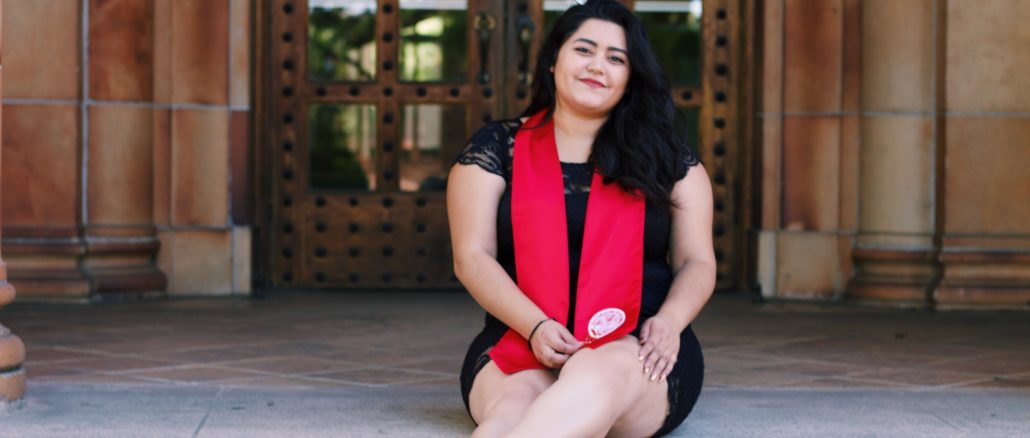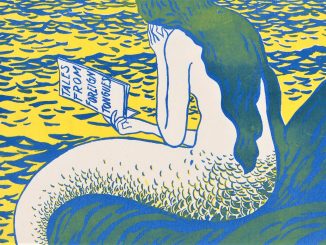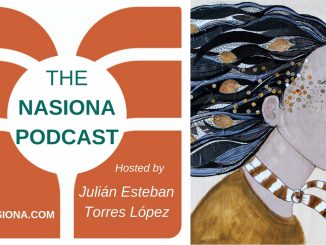
The daughters of immigrants born in the United States, particularly women of color, have often been tasked to carry the emotional weight of our parents’ expectations and what we believe is required of us to survive as well as succeed in a world that challenges and detests our continued existence in our own country. We lament the loss of our childhoods, marinate in feelings of anxiety and guilt to avoid offending anyone, and compulsively take care of others in our lives even if it is a detriment to our mental health. Despite the negative side effects, there are positive results. Children of immigrants have incredible drive and an unparalleled need to succeed. We attend higher education at a far higher rate than ever before, searching for that piece of paper that says “I was worth it.”
***
A quick tip to the unfamiliar reader: do not ask me or any other daughter of immigrants why their family immigrated here. It’s an irrelevant question. We will tell you if we feel the need to. In fact, you’re disrespectful for essentially asking me to defend my existence and my family’s existence as if it is casual small talk. I’ve met some immigrants who immigrated because of discrimination, poverty, violence, rape, or corruption. Do you really believe you deserve to reach into their wounds and tear them open to find some sort of justification? Are you even ready to hear those stories before looking at your own?
Why (unless you were descended from the indigenous people or forced across the ocean as a slave) are you here? Why did your family cross? What did they do when they arrived? Did they cross legally? Was it because of some moral imperative? We all have our reasons now, don’t we?
***
As the daughter of Mexican immigrants, I felt like I was constantly failing to meet my parents’ standards as a child and even now as a young woman. I can still hear my mother—the voicebox of my father—whispering in my ear that I should have worn longer shorts, I should put my hair up and out of my face, I should be more lady-like and stop acting like a tomboy, I should speak more Spanish, I should visit more, I should spend more time with my father, I should, really.
To be honest, demanding whispers are better than the questions. Those questions that pierce through the middle of my chest with devastating accuracy like, Why don’t you like to visit? Why don’t you call us more? Why don’t you tell us when you get awards? Why don’t you invite us to your award ceremonies? Are you ashamed of us?
Am I? I don’t think so. I just don’t think I can go back to being who I was before—that person they wanted—whoever that was. The one who obeyed regardless of any tears that streamed down my face even if the orders were to stop crying and complaining as if there weren’t a whole roof over my head and food on the stove and clothes on my back, the one who cleaned the house when asked and pretended that it never felt like the white walls were closing in on me while I watched over my younger brother day after day and imagined what it would be like if I stayed there forever. I would be those walls, rotting slowly on the inside.
I remember the day I told my mother and father that I was moving to Chico for college. I received a scholarship that I used as a deposit on an apartment and I would use my financial aid to pay rent. My parents and I were sitting in my father’s work truck outside of the casino my mother worked at. My mother immediately started crying.
“You could just commute. It’s not safe for you to live there alone. Are you doing this because you’re ashamed of your brothers because they’re sick?” My mother often brought this last question up as the reason for anything I did that she didn’t like. She was always under the impression that I wanted to leave their home because I was embarrassed by my eldest brother Armando who has Tourette’s syndrome and is deaf and my youngest brother Matias who has autism. I love them dearly and I sometimes felt like I cared for them more than my parents did.
“Do what you have to do.” My father said in a voice that he held as steady as his gaze on his steering wheel. He was typically the one to tell me no if I asked to do anything outside of his house. When I was little, I was too scared to ask him for anything. I would see the cuts and bruises on my father’s body at the end of a long workday so I swallowed my trivial desires and slashed my expectations. I wanted my parents to be proud of me for so long, especially my father who had always called me “Princess”. I forced myself to produce the best grades, take leadership positions at school, and play competitively for my father’s soccer team. I stressed myself out so much I developed an ulcer during my junior year of high school before I finally decided to quit playing soccer. It was a decision that negatively impacted our relationship and reduced a substantial amount of time we typically spent together.
“I’ll try to visit often. You could come get me on Friday and drop me off on Sunday. It’s too complicated for you to drop me off and pick me up every day and I’m still a terrible driver.” I reasoned. My father nodded slowly after hearing the part about me visiting on weekends. My mother rubbed her eyes and stared out the passenger window with a gloomy stare. They came around after they found out one of my uncles worked for the apartment complex and would be able to check on me once a week. My parents helped me move into my first college apartment in September 2015, a cheap one-bedroom in Chico, CA that I shared with a white girl who dropped out of college a few months after we moved in together.
When I left for college, it felt like the severing of a limb. Leaving my parents to care for my disabled brothers meant my mother would have to return to the dreaded graveyard shift at the casino and my father would have to miss work to rush home when my younger brother pulled his pants down on the bus again or had a meltdown in his special education classroom. I knew what I had done. Inside my first shitty college apartment, I spent nights lying awake with a weight on my chest while imagining how far my parents’ bodies would stretch themselves over every day with only bones and flesh to hold them together.
I often imagine myself with a chain connected around my waist and my parents’ home. I always feel the phantom of its weight yanking me southward, back to a yard smeared with the neighbors’ cats’ shit and a house that wasn’t my home anymore, that probably never was.
***
I fidget while I work jobs that provide me with air conditioning and a decent wage while my father drags his fragile bones over the yards of the wealthy and my mother limps through the cigarette smoke of geriatric gamblers. I feel the pit in my stomach tighten over spending money when I eat out at those ridiculously expensive “healthy” restaurants, counting all the times my family lived off a diet of sopa de fideo and arroz con frijoles. I feel guilt over choosing to attend grad school when I could have found a job and helped my parents with the last few years of their mortgage on the house I grew up in. How dare I have the audacity to live a life where I’m allowed to pursue my dreams when they gave up pleasure, sleep, comfort, family, and friends for me?
But then I remember all the times I spent crying inside the room I shared with my brother after missing out on sleepovers due to my mother’s fear that I would be molested by one of my white friends’ fathers, after repeating to my friends that “my parents said no” over and over again, after being told no by my parents over and over again, after watching my older brother Junior breeze in and out of our front door like a ghost, after hearing my father ask my mother “cuando la vas a enseñar a cocinar” and scolding her for failing to teach me “como ser mujer” so many times behind my back.
Painful memories burn themselves onto brains like I singe the tips of my fingers while flipping tortillas for my father. They won’t kill me but it still stings when I think about it.
***
My older cousin Mayra is the only one who fully understands the conflict in my head. She too had chosen to attend grad school. I had admired her my whole life and now I was only a year behind her in school. When we spoke about our experiences as first-generation students, we would eventually wander into the topic of our parents.
“They are never going to fully understand anything we do. I tell my parents about all the committees I’m on and the leadership positions I’ve had but they just don’t get it. That doesn’t mean your work is pointless but it hurts when you talk about the things you love and all they can say is, ‘bueno, mija’. You have to be more in love with your work than you are with your family or it will kill you inside.”
I asked her if she worried about her parents when she left for school as well, wondering if her answer would confirm the question in my mind: Was I the monster I believed I was for leaving my parents behind?
“I think they worried more about me honestly but I did go home every weekend so I think that helped. I did whatever I wanted but whenever they called, which was every single day, it was like ‘oh, fuck, I forgot that I can’t be out drinking, I’m supposed to be studying’ so I would have to just lie so that they felt better. I wanted to go out and it wasn’t like I was ruining my life or anything, I was just experiencing it for the first time without them.”
My parents didn’t call very often during my first year. I didn’t call or see them very much either. I was busy smoking weed out of an apple for the first time, getting blacked out in places I definitely wasn’t supposed to be, stealing toilet paper from fraternities under the guise of drunkenness, and meeting a handful of men and women that I now wish I had never met. I didn’t need the shadows of my parents’ judgment behind me. I, like Mayra, didn’t ruin my life either. I didn’t find my undergraduate work impossible like my high school counselor said I would. I learned moderation, I was able to meet people I actually loved being around who confirmed that I wasn’t crazy for following my dreams, and got accepted into grad school. The drive to succeed keeps me from veering too far off the path I decided for myself.
***
During my junior year of college, I won a diversity award from the English department. I was excited since I had never truly felt noticed at my university before this point. It was strange to walk through campus and have friends to chat with as well as professors I was able to confide in. To me, it was a sign that I was on the right track for my future but I couldn’t afford to get comfortable yet. Thoughts are bouncing in the back of my head that consistently slam against my stream of consciousness that reminds me that it’s not enough yet, there’s work to be done and this isn’t just about me. But there’s another thought that stands tall and rages against every other thought inside my mind: I will win this war for myself and the glory is all mine.
Apparently, they send out a letter for those types of things and, since my parents’ address is listed as the permanent mailing address, my mother was determined to go. I didn’t feel like a short ceremony was worth the hour-long drive from Sutter to Chico but my mother insisted that I was choosing to exclude them from my life. What my mother did not anticipate was that my grammar professor was going to out me to my father in front of a large crowd of people.
I told my mother that I was pansexual when I was seventeen. My mother made a lot of “allowances” for me growing up by making little effort to enforce gender roles other than verbally criticizing me. She had been raised as a tomboy by her grandfather in Mexico and often blamed my defiance on growing up in the United States. But when I came out to her, my mother stated that this was what happened when you grow up en el norte con tus amigos güeritos. She insisted it was a phase and begged me to not tell my father that his daughter was a jota. I was too terrified of my father’s reaction to even consider speaking to him about it. However, in my application essay for the award, I was honest about who I am. In my world, I was the brutally honest queer Chicana. In my parents’ world, I was still their princesa.
I remember standing up in front of my parents with a throat that was somehow too dry and too wet at the same time and I couldn’t stop swallowing to save my life. I remember my boyfriend’s worried gaze looking over at my father and my mother’s shocked gaze meeting my panicked stare. I could feel the slight shift in their seats from the front of the room. I still remember how I asked my boyfriend later that night if anyone clapped when I received my award. I didn’t even notice how many of my peers cheered for me or the professors who were happy to see my growth after watching my progress over the last few years, huddled together in small metal chairs around my parents. My body couldn’t comprehend the intense emotions that hectically slammed my heart against my chest. Pleasure, pride, and pain all scrambled for power while I fought to stabilize my vision, distorted by severe anxiety. The rest is pretty much a blur until we somehow ended up in the parking lot of an Italian restaurant near the college.
At first, I thought my father would refuse to speak to me or scream at me in the parking lot. It turned out that he couldn’t that day because my parents had also come to see me to guilt me into moving home for the summer.
“We’ll need you to move home as soon as you can. We need someone to take care of Matias while we’re at work. It’s the summer now and we can’t be home all the time. We rarely sleep anymore.” My mother said in her perpetually languid tone.
“I can’t.” I managed to choke out, my throat still semi-paralyzed with fear.
“Why not?” My mother demanded as my father stared at the ground in front of me.
“I just can’t. I have to work this summer. Ask Junior, he literally lives at home with you. You could even ask one of my tias.” I countered. That’s a valid answer, I thought to myself.
“I don’t want to bother them and you know how Junior is.” Fuck Junior! My estranged older brother always treated me like I was worthless and my parents had never stopped his violent and emotionally toxic abuse towards me. He was their son and that meant something in immigrant families. He carried the family name and my father’s name, protected by the five letters that we shared and a paternal blessing. He despised me but he would never harm our younger brother. He also did nothing in my parents’ house other than work the graveyard shift at a mental health facility and play video games. He was a social recluse so I knew he had the free time. He claimed that I was a selfish and spoiled daughter who couldn’t do a single thing for myself. The response I gave to my mother would only further support the narrative he believed about me.
“Mom, I can’t. That’s it.” I felt like I owed her more of an explanation but I couldn’t put it into words. I know it makes me sound like a child but I didn’t want to go. I didn’t even really need to go. Yet, I felt a wave of intense guilt.
I don’t remember what else we said to each other before my parents left but I remember my father didn’t say anything except goodbye.
***
After being raised in a predominantly white and conservative area, the only comparisons I had were between myself and the few cousins who went to college. When I met other daughters of immigrants in college, I heard so many of the same stories and phrases repeated back to me.
“My professors and bosses always say, ‘oh, you’re so mature for your age,’ like, no shit, it’s the trauma. Plus, I raised my siblings the whole time my parents were working, I’m basically their mom. I didn’t even have time to mess around because I had to go home straight after school.”
Family first is one of the strongest themes in most immigrant families. I never had a babysitter who wasn’t related to me and neither did any of my cousins. We had each other to look after because who knew what strangers would do to you?
“You can come visit me at my parents’ place this summer but don’t tell them any stories. They don’t even think that I leave my apartment past 9 o’clock.”
Secrets are second nature to many daughters of immigrants. If you want to have a life, you’re going to have to lie. We even share some of the same lies like “we stopped to eat” (they can’t get mad at you for someone else being hungry) or “we just watched a movie” (we definitely didn’t watch half of the movies we told our parents we were going to see, extra points if it wasn’t with who you told them you were hanging out with). You can’t just go places without asking your parents, even if you’re an adult. Even I feel a strange responsibility to always let my boyfriend know where I’ll be going and who I’ll be with whenever I leave for school. Others explain this feeling away by saying that it’s just a “respect thing” but we all know that it’s really about control. Our parents had the ultimate say in everything we did growing up and many still allow their parents this level of control over their lives. It’s comforting to know that your family will always be there for you and help you navigate life from a secure but controlled environment.
Interestingly enough, I heard my anxieties mirrored during some of my conversations with other daughters as well.
“I just gotta graduate so I can work, you know? I feel like I need to pay my parents back for how much they helped me out.”
The goal is usually to graduate with a job that pays higher than whatever both of your parents make combined which typically isn’t very much. Poverty terrifies us, always snapping at our heels and tripping us up as we step forward into higher education. Most daughters of immigrants fear taking out loans and putting themselves into debt which is why many drop out or overwork themselves to the point that their grades suffer. I personally work two part-time jobs and a couple of academic side hustles like tutoring my little cousins in Los Angeles at night. At one point, my cousin Beatriz worked three part-time jobs while taking nineteen units. When we look at scholarship applications and they ask us for our extracurricular activities, we laugh before leaving the box blank.
“I can’t mess up or fail anything. It’s not just because of all these elitist motherfuckers that are waiting for us to fail and think we’re here because of affirmative action. We can’t fail because our parents created something from nothing and we have to do better. We have to.”
We have to think of our parents who allowed us to have a better life but we also have to think about our younger siblings and little cousins. Who will they have to look up to if not us? Who can they turn to in the future if we are not already there? Despite the fact that academia wasn’t built for us, especially women of color, we have to continue and make it a better place for those who will come after us.
These mindsets, these culminations of guilt and anxiety, tear away at our mental health. One of the few studies about mental health and first-generation children noticed that first-generation children are more likely to have mental health issues manifest at a young age. As someone who has been showing symptoms of Bipolar Depression since I was four, I already knew that. But they did the math and found out that there are consistently higher rates of depressive symptoms and anxiety in Afro-Latino and Mexican-American children than almost any other ethnic group. Those are just the few kids that make it into a therapist’s office due to the stigma against therapy in immigrant communities because of how vulnerability is viewed as shameful on top of the lack of access to therapy for a number of reasons like lack of health insurance, semi-irrational fears about accidentally exposing an undocumented relative or financial reasons. Some parents just outright dismiss their children by blaming Americans and their shameless sense of self-importance, denying any fault in their parenting and sometimes even ignoring their own evident mental health issues.
Is any of this really surprising though? There’s so much to be stressed about as the daughter of an immigrant. If your parents are undocumented, you’ll not only be left alone if they’re deported but they might take your siblings away as well if you’re a mixed-status family. Not to mention the run-of-the-mill oppression from racial discrimination, violence against women, and sexism.
***
In May of 2019, I graduated with my bachelor’s degree in English from Chico State on my college’s stadium as my parents sat in the bleachers. I stood amongst my English major friends who all seemed to be calling their parents and arranging their post-graduation dinner plans. I tightly hugged and took photos with some of my favorite professors who congratulated me on my acceptance into graduate school. I was grateful that I would have at least two more years with these incredibly kind and supportive people. When I walked on stage to receive my diploma, I was greeted by the excited giggles and words of congratulations from the dean of the College of Humanities and Fine Arts. I waved to the university’s photographer and the corners of my mouth ached with overwhelming joy.
Later that day, my partner told me about how he watched my mother and father cry and tell him about how they were so proud of me. But when I met up with them afterward, my father gave me a soft hug and a card that stated how he had worried every day about my safety and that he had reserved his spot as my biggest fan for whenever I started writing my first book while my mother gave me a toothless smile and a hug.
While we stood and took the expected post-graduation photos, I saw a slew of graduation caps from other immigrant daughters that said hija de immigrantes or producto de immigrantes or they immigrated so I graduated. They were absolutely beautiful pieces of art decorated in the bright flags of their countries and fake flowers with rhinestones glued everywhere that were visible from the bleachers even on a cloudy day. I felt uncomfortable adjusting my cap that proudly displayed Sandra Cisneros’ quote in large black letters glued onto a glittery golden background: “I have begun my own quiet war.” The other daughters recognized the contributions their parents made to ensure their chances of success. But they also admitted the idea that many first-generation children grow up believing: my successes are not my own.
I have to admit that I too burst with pride about being a first-generation student. I feel the burning excitement in me when I see another first-generation student succeed and achieve their dreams. But I recognize their efforts. I see the nights they spent studying while their roommates partied and the mornings they spent preparing themselves to take two steps forward before being pushed one step back. I heard them sob in the bathroom outside their classes when it all gets to be too much. I see them struggle to heal from the burn of the brand: “American Dream”.
***
I admire la lucha, the sense of pride in hard work that my parents instilled in me. There is no greater satisfaction than creating something meaningful with your own two hands. So I refuse to believe that my life and success do not belong to me. My work, these pages, were created by my entire self, sitting in the room I pay for with my own money, weaving memories into art, and blinking past tears over a dimly lit keyboard. The reverberation of emotional resonance rattled my bones and I clung to my writing desk for stability. So I claim these words for myself. Call me self-centered. Call me ungrateful. I will win this war because I have finally decided I am worthy of the fight.
AUTHOR

Alondra Adame
Alondra Adame is a poet, essayist, and graduate student in Chico, CA, hoping to pursue an MFA in the future and eventually write a few books. A few topics she loves to write about are mental health, LGBTQ+ issues, Chicanx culture, and the bittersweet events that have guided her life.


